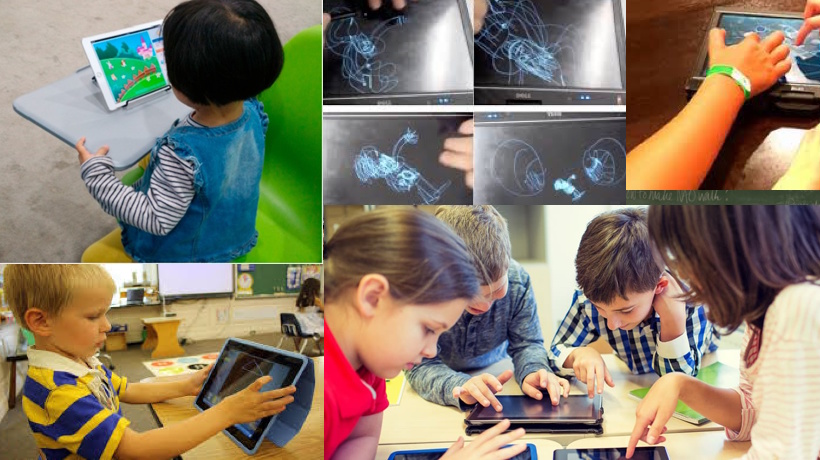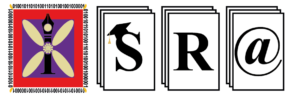Abstract
In spite of great improvements in early diagnosis and interventions, most children diagnosed with Autism Spectrum Disorders (ASD) are unlikely to live independently when they reach adulthood. We have been conducting research on novel computer-based interventions with the goal of promoting social skills. Working with 26 children with ASD, their teachers, and other stakeholders, we have iteratively developed a set of activities based on applications that run on multitouch tablets. Our observations suggest these activities increased pro-social behaviors such as collaboration and coordination, augmented appreciation for social activities, and provided children with novel forms of expression.
Keywords
children, autism, multitouch, tablet, social skills
Introduction
As the number of children diagnosed with Autism Spectrum Disorders (ASD) continues to grow [7], we are reminded of the needs of this community. In spite of great strides in early diagnosis and interventions, the outcomes for a majority of children with ASD are still poor, with few able to live independently when they reach adulthood [4, 10, 27]. To answer these needs, many in the computing field have begun conducting research on computer-based interventions for children with ASD.
Our research has concentrated on developing computer-supported activities to enhance the social skills of children with ASD with an emphasis on collaboration, coordination, creativity, compromising one’s interests with the interests of others, and understanding emotions. We have adopted multitouch tablets as a platform to support face-to-face activities and have developed a toolbox of simple, mistake-free, open-ended applications. We have developed the activities and applications working with 26 children with ASD (ages 5-14), their teachers, special education staff, and parents. We have also consulted with a local support group for adults with ASD. We have made our software open source and developed it targeting commoditized hardware to maximize access and sustainability.
Conclusion
We have presented our experiences conducting activities with multitouch tablet applications designed to promote collaboration, coordination, creativity, compromising one’s interests with the interests of others, and emotional understanding in children with ASD. In doing so, we explored a new platform to approach children with ASD in multitouch tablets. This is particularly relevant given the recent surge in the use of tablet computers such as the iPad. We took a different approach in providing many simple, open-ended, mistake-free applications instead of concentrating on one, and in focusing on activities as opposed to technology. The results so far are encouraging, with evidence that activities with our applications can lead to pro-social behavior, enabling children with ASD to enjoy social activities, develop appropriate social skills, and express themselves. We hope this work inspires others to continue making use of tablets and other novel technologies to support and encourage face-to-face social activities for children with ASD.
About KSRA
The Kavian Scientific Research Association (KSRA) is a non-profit research organization to provide research / educational services in December 2013. The members of the community had formed a virtual group on the Viber social network. The core of the Kavian Scientific Association was formed with these members as founders. These individuals, led by Professor Siavosh Kaviani, decided to launch a scientific / research association with an emphasis on education.
KSRA research association, as a non-profit research firm, is committed to providing research services in the field of knowledge. The main beneficiaries of this association are public or private knowledge-based companies, students, researchers, researchers, professors, universities, and industrial and semi-industrial centers around the world.
Our main services Based on Education for all Spectrum people in the world. We want to make an integration between researches and educations. We believe education is the main right of Human beings. So our services should be concentrated on inclusive education.
The KSRA team partners with local under-served communities around the world to improve the access to and quality of knowledge based on education, amplify and augment learning programs where they exist, and create new opportunities for e-learning where traditional education systems are lacking or non-existent.
FULL Paper PDF file:
Multitouch Tablet Applications and Activities to Enhance the Social Skills of Children with Autism Spectrum DisordersBibliography
author
Year
2012
Title
Multitouch tablet applications and activities to enhance the social skills of children with autism spectrum disorders
Publish in
Springer, Personal and Ubiquitous Computing
Doi
PDF reference and original file: Click here
Nasim Gazerani was born in 1983 in Arak. She holds a Master's degree in Software Engineering from UM University of Malaysia.
-
Nasim Gazeranihttps://ksra.eu/author/nasim/
-
Nasim Gazeranihttps://ksra.eu/author/nasim/
-
Nasim Gazeranihttps://ksra.eu/author/nasim/
-
Nasim Gazeranihttps://ksra.eu/author/nasim/
Professor Siavosh Kaviani was born in 1961 in Tehran. He had a professorship. He holds a Ph.D. in Software Engineering from the QL University of Software Development Methodology and an honorary Ph.D. from the University of Chelsea.
-
siavosh kavianihttps://ksra.eu/author/ksadmin/
-
siavosh kavianihttps://ksra.eu/author/ksadmin/
-
siavosh kavianihttps://ksra.eu/author/ksadmin/
-
siavosh kavianihttps://ksra.eu/author/ksadmin/
Somayeh Nosrati was born in 1982 in Tehran. She holds a Master's degree in artificial intelligence from Khatam University of Tehran.
-
Somayeh Nosratihttps://ksra.eu/author/somayeh/
-
Somayeh Nosratihttps://ksra.eu/author/somayeh/
-
Somayeh Nosratihttps://ksra.eu/author/somayeh/
-
Somayeh Nosratihttps://ksra.eu/author/somayeh/





